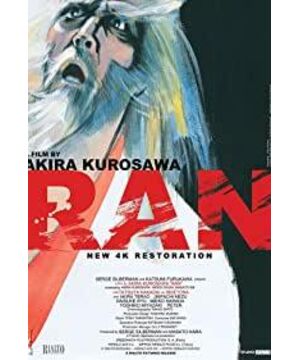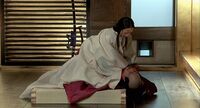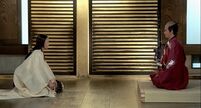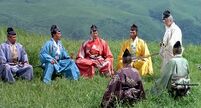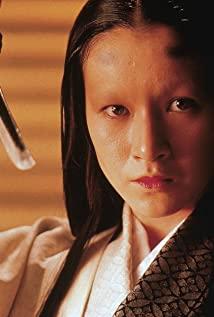Akira Kurosawa, who was 181 in height, was probably regarded as an outlier in Japan where the average height of adult men was less than 160 at that time.
The same goes for his films. To this day, Japanese directors are still not good at big scenes and big battles. The world-renowned masters are either in the tone of oriental aesthetics like Ozu and Mizoguchi, or Oshima Nagisa, Kitano Takeshi and even Sonoko Wenwen Miike Takashi A master of violence and elements of CULT.
Only Akira Kurosawa, who walked with a dignified and righteous teacher, not only brought Japanese films to the international stage, but also deeply influenced his younger colleagues from all over the world. The four major Hollywood directors all respected this senior from the East, and even looked like they wanted to act as a lackey under the Ivy League. This is really not the highest praise that ordinary people can bear.
And these four people almost single-handedly established the pattern of modern Hollywood, so to a certain extent, it is not an exaggeration to say that it was Akira Kurosawa that made movies, especially commercial blockbusters, what they are today.
What is even more commendable is that Akira Kurosawa's works have a profound textual connotation while maintaining a high ornamental value. In the humanistic spirit, Akira Kurosawa continued the classical tragic temperament from the ancient Greek comedy master to Shakespeare. In many of his works, there is a shadow of the so-called "first tragedy", that is, heroic characters and destiny The struggle is no match for the ending that is manipulated by fate. And the unyielding fighting spirit and the tragic ending of fate in it constitute a moving movement with a vast epic atmosphere.
This tendency is particularly evident in Kurosawa Akira's costume films. Whether it is "Seven Samurai", "Spider's Nest City" in the middle of his career, or "Shadow Samurai" in the later period, all performed in the context of the history of Japan's Warring States Period. A tragic story like Achilles.
Among them, "Chaos" can be described as the pinnacle of work.
"Ran" was filmed in 1985 and was Kurosawa's last work in the 1980s. Although Kurosawa also directed three films after entering the 1990s, it was more like a review and summary of his life by an accomplished old man. From the perspective of the style of the work, "Chaos", which has been prepared for ten years and cost a lot of money, not only follows Akira Kurosawa's consistent huge scenes, precise scheduling and beautiful images, but also highlights the demeanor of a generation of masters with its compassionate works. Or in form, it is worthy of the most majestic and final peak of his career.
2.
There are countless movies adapted from Shakespeare's works, some of which are original and even more unrecognizable, but the superficial resemblance or dissimilarity is not the criterion for distinguishing masterpieces from mediocre works. The inner spiritual inheritance is the key.
Therefore, when Akira Kurosawa moved the stories that happened in the Middle Ages written by Shakespeare to the Warring States period of Japan, and closely matched the humanistic spirit of the Western knight era with the Eastern Bushido, it would amaze the world. The cultural transplant of such a large span is so smooth and invisible, it is not a simple word to describe it.
In fact, whether it is an ancient Greek tragedy or Shakespeare's classic tragedy, there is an ancient Chinese saying that is very appropriate - "The heaven and the earth are not benevolent, and all things are dogs." The ruthlessness of heaven and the injustice of fate are at the heart of all tragedies. Only such a huge and irreversible force can make the viewer feel the powerlessness of the characters, and at the same time experience the unparalleled sadness of the absurd behavior of the heroes.
But Taoism regards heaven and earth as inhumane, and advocates rule by inaction, while heroes in Western tragedies never completely surrender themselves into the hands of fate. They struggled, worked hard, struggled, and fought to the death, and hope often sprouted like spring seedlings countless times, but was ruthlessly extinguished like embers. In the end, it is the victory of the will of God, and the moving sad songs of the defeated heroes one after another.
Chaos is like that. There are no complete bad guys in the movie. Xiuhu killed too much in the first half of his life, but now he is just an old man in his twilight years. Although Taro and Erlang are extremely unfilial, they are idiots who are bewitched by women, even Feng who caused all the tragedies. Madam, is it not a poor person who has lost his reason for revenge? The tricks of fate and the will of God have made everyone change the trajectory of their lives. They seem to be working hard for the sake of power and the world. After all, no one can escape the end of their lives. Just like the portrait that finally fell from Tsurumaru's hand, the gods and the Buddhas are just looking at this chaotic world with a smile, just like the Titans who manipulated the Trojan War, all kinds of human beings, yes They are just a game.
But compared to the original work, Akira Kurosawa added a causal fatalism with Eastern philosophy to the story. Every character is not innocent. The crime of Xiuhu, Taro and Jiro's murder is self-evident, and Madam Feng's coquettish and chaotic master is also clear at a glance. Even the two most innocent tragic characters - Saburo and Madame Su, the former is too unrestrained Uninhibited and open-mouthed, offending his elder brother and losing his father's love; the latter just dodging and escaping reality, is there no reason for him to be punished?
There is no complete justice and no complete villain. In his later years, Akira Kurosawa, with a thorough understanding and disappointment of human nature, made up a costume drama about the hypocrisy of human nature and the lack of family affection.
If we think deeply, it is not difficult to read the important theme of Kurosawa Akira's works - the decline of Bushido spirit and the collapse of traditional ethics.
As Akira Kurosawa's last epic blockbuster, the script for "Chaos" was written from 1975 until the film was successfully released in 1985. During the ten years, I did not know how many additions, deletions, and carvings were made. The story not only follows the core narrative of "King Lear", but also ingeniously narrates the allusions of the "Teaching of the Three Arrows" by Maori Yuan, who is well-known in Japan. integrated in it.
Apart from the director, Akira Kurosawa is undoubtedly a master as a screenwriter.
This reminds people of another case of Shakespeare's orientalization - "The Banquet" directed by Feng Xiaogang. Judging from many factors, "The Banquet" and "Chaos" have similarities, except that they are both adapted from Shakespeare's four famous tragedies, in the reference to the Eastern drama form and the shaping of the sense of ritual, the art design and the dignified sense of the picture Feng Xiaogang is suspected of stealing his teacher in terms of his creation, his confusion about human nature and the ruthlessness of heaven. And "Night Banquet", at least in terms of visual effects, has achieved the ultimate level of Chinese films. Looking at the reasons for its failure, there are the failure of casting, the paleness of the narrative, and the bluntness and deliberateness of the theme expression, but the most fundamental is the feast created by Feng Xiaogang with the artistic style of 20 years ago. The audience's table, it is inevitable that some tastes do not match.
3.
Teruyo Nogami, who has long served as the recorder of Akira Kurosawa's film, once wrote a memoir about the master, titled "Waiting for the Cloud to Arrive". This allusion comes from the filming period of "Ran". In order to capture the ideal cloud, Akira Kurosawa led the film crew to wait for more than three months and spent a lot of real money.
This is only a small part of the 2.4 billion yen production cost of the film, but it reflects the director's meticulous creative attitude. In fact, the "cloud" brought by Akira Kurosawa did play an important role. Whether these actors in the sky perform a one-man show in an empty shot or serve as a background in a character performance, they all have a metaphorical role with a sense of mystery and fate, and they also become part of the narrative to drive the plot. It can be said that it is these clouds that give "Chaos" its unique artistic charm.
As Akira Kurosawa's most generous masterpiece, this film has too many innovations in film techniques that can be passed down to future generations. In terms of visual effects, the 1,400 sets of kimonos and armors carefully designed by the costumers are incomparably exquisite, and the vast formation of 30,000 extras and 15,000 war horses is also unprecedented. The strong Japanese Noh-style performances and soundtracks not only do not appear abrupt, but complement the narrative and themes, making the film full of Dongying's exotic flavor.
When the film was released, 75-year-old Akira Kurosawa said emotionally: "I feel that "Chaos" is my lifelong pursuit, and I am eager to integrate the remaining power in my body into this film. "Chaos" is my will."
Usually successful writers will be crowned with the title of "equal body of writing", so Akira Kurosawa, who has won numerous awards for his masterpieces in his life, should be called "equal to honor". Although he has also experienced a dark period of creative lows and even suicide, I think Akira Kurosawa's heart should be full, because what is happier than an artist who uses the greatest work of art as his will?
View more about Ran reviews


